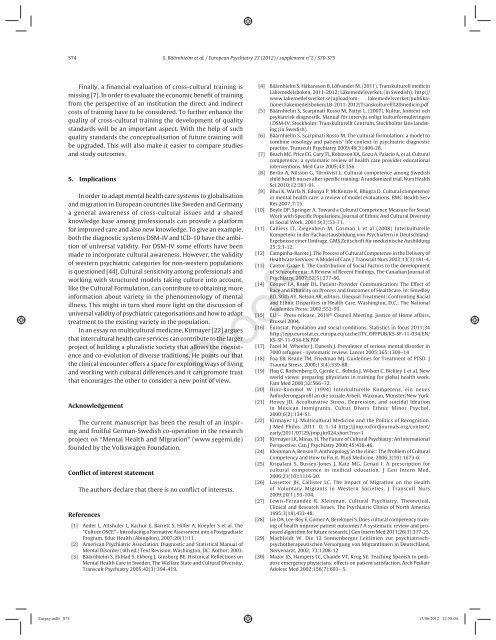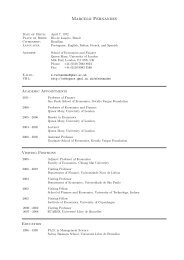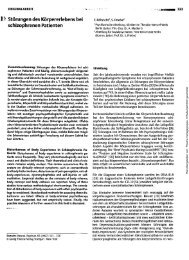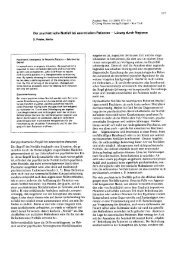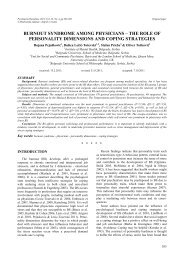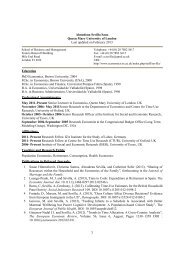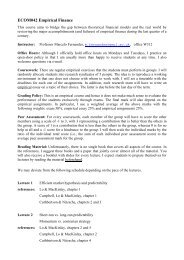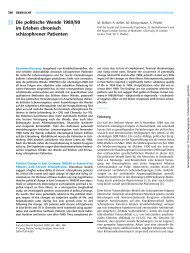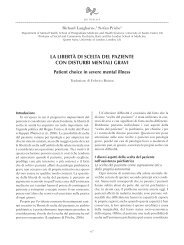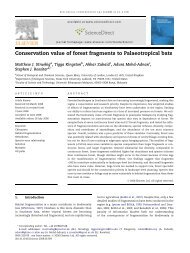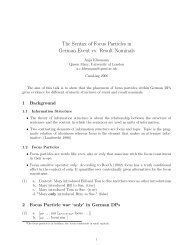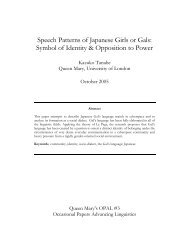Proofs - Personal Webspace for QMUL - Queen Mary, University of ...
Proofs - Personal Webspace for QMUL - Queen Mary, University of ...
Proofs - Personal Webspace for QMUL - Queen Mary, University of ...
Create successful ePaper yourself
Turn your PDF publications into a flip-book with our unique Google optimized e-Paper software.
S74 S. Bäärnhielm et al. / European Psychiatry 27 (2012) / supplement n°2 / S70-S75<br />
Finally, a fi nancial evaluation <strong>of</strong> cross- cultural training is<br />
missing [7]. In order to evaluate the economic benefi t <strong>of</strong> training<br />
from the perspective <strong>of</strong> an institution the direct and indirect<br />
costs <strong>of</strong> training have to be considered. To further enhance the<br />
quality <strong>of</strong> cross- cultural training the development <strong>of</strong> quality<br />
standards will be an important aspect. With the help <strong>of</strong> such<br />
quality standards the conceptualisation <strong>of</strong> future training will<br />
be upgraded. This will also make it easier to compare studies<br />
and study outcomes.<br />
5. Implications<br />
In order to adapt mental health care systems to globalisation<br />
and migration in Europ ean countries like Sweden and Germany<br />
a general awareness <strong>of</strong> cross- cultural issues and a shared<br />
knowledge base among pr<strong>of</strong>essionals can provide a plat<strong>for</strong>m<br />
<strong>for</strong> improved care and also new knowledge. To give an example,<br />
both the diagnostic systems DSM- IV and ICD- 10 have the ambition<br />
<strong>of</strong> universal validity. For DSM- IV some ef<strong>for</strong>ts have been<br />
made to incorporate cultural awareness. However, the validity<br />
<strong>of</strong> western psychiatric categories <strong>for</strong> non- western populations<br />
is questioned [44]. Cultural sensitivity among pr<strong>of</strong>essionals and<br />
working with structured models taking culture into account,<br />
like the Cultural Formulation, can contribute to obtaining more<br />
in<strong>for</strong>mation about variety in the phenomenology <strong>of</strong> mental<br />
illness. This might in turn shed more light on the discussion <strong>of</strong><br />
universal validity <strong>of</strong> psychiatric categorisations and how to adapt<br />
treatment to the existing variety in the population.<br />
In an essay on multicultural medicine, Kirmayer [22] argues<br />
that intercultural health care services can contribute to the larger<br />
project <strong>of</strong> building a pluralistic society that allows the coexistence<br />
and co- evolution <strong>of</strong> diverse traditions. He points out that<br />
the clinical encounter <strong>of</strong>fers a space <strong>for</strong> exploring ways <strong>of</strong> living<br />
and working with cultural differences and it can promote trust<br />
that encourages the other to consider a new point <strong>of</strong> view.<br />
Acknowledgement<br />
The current manuscript has been the result <strong>of</strong> an inspiring<br />
and fruitful German- Swedish co- operation in the research<br />
project on “Mental Health and Migration” (www.segemi.de)<br />
founded by the Volkswagen Foundation.<br />
Confl ict <strong>of</strong> interest statement<br />
The authors declare that there is no confl ict <strong>of</strong> interests.<br />
References<br />
[1] Aeder L, Altshuler L, Kachur E, Barrett S, Hilfer A, Koepfer S et al. The<br />
“Culture OSCE” - Introducing a Formative Assessment into a Postgraduate<br />
Program. Educ Health (Abingdon), 2007;20(1):11 .<br />
[2] American Psychiatric Association. Diagnostic and Statistical Manual <strong>of</strong><br />
Mental Disorder (4th ed.) Text Revision. Washington, DC: Author; 2003.<br />
[3] Bäärnhielm S, Ekblad S, Ekberg J, Ginsburg BE. Historical Refl ections on<br />
Mental Health Care in Sweden. The Welfare State and Cultural Diversity.<br />
Transcult Psychiatry 2005;42(3):394- 419.<br />
[4] Bäärnhielm S, Håkansson B, Löfvander M. (2011). Transkulturell medicin<br />
Läkemedelsboken, 2011- 2012; Läkemedelsverket. (in Swedish). http://<br />
www.lakemedelsverket.se/upload/om- lakemedelsverket/publikationer/lakemedelsboken/LB-<br />
2011- 2012/Transkulturell%20medicin.pdf<br />
[5] Bäärnhielm S, Scarpinati Rosso M, Pattyi L. (2007). Kultur, kontext och<br />
psykiatrisk diagnostik. Manual för intervju enligt kultur<strong>for</strong>muleringen<br />
i DSM- IV. Stockholm: Transkulturellt Centrum, Stockholms läns landsting<br />
(in Swedish).<br />
[6] Bäärnhielm S, Scarpinati Rosso M. The cultural <strong>for</strong>mulation: a model to<br />
combine nosology and patients’ life context in psychiatric diagnostic<br />
practice. Transcult Psychiatry 2009;46(3):406- 28.<br />
[7] Beach MC, Price EG, Gary TL, Robinson KA, Gozu A, Palacio A, et al. Cultural<br />
competence: a systematic review <strong>of</strong> health care provider educational<br />
interventions. Med Care 2005;43:356<br />
[8] Berlin A, Nilsson G, Törnkvist L. Cultural competence among Swedish<br />
child health nurses after specifi c training: A randomized trial, Nurs Health<br />
Sci 2010;12:381- 91.<br />
[9] Bhui K, Warfa N, Edonya P, McKenzie K, Bhugra D. Cultural competence<br />
in mental health care: a review <strong>of</strong> model evaluations. BMC Health Serv<br />
Res 2007;7:15.<br />
[10] Boyle DP, Springer A. Toward a Cultural Competence Measure <strong>for</strong> Social<br />
Work with Specifi c Populations. Journal <strong>of</strong> Ethnic And Cultural Diversity<br />
in Social Work, 2001;9(3):53- 71.<br />
[11] Calliess IT, Ziegenbein M, Gosman L et al (2008) Interkulturelle<br />
Kompetenz in der Facharztausbildung von Psychiatern in Deutschland:<br />
Ergebnisse einer Umfrage. GMS Zeitschrift für medizinische Ausbildung<br />
25:3;1- 12.<br />
[12] Campinha- Bacote J. The Process <strong>of</strong> Cultural Competence in the Delivery <strong>of</strong><br />
Healthcare Services: A Model <strong>of</strong> Care. J Transcult Nurs 2002;13(3):181- 4.<br />
[13] Cantor- Graae E. The Contribution <strong>of</strong> Social Factors to the development<br />
<strong>of</strong> Schizophrenia: A Review <strong>of</strong> Recent Findings. The Canadian Journal <strong>of</strong><br />
Psychiatry, 2007;52(5):277- 86.<br />
[14] Cooper LA, Roter DL. Patient- Provider Communication: The Effect <strong>of</strong><br />
Race and Ethnicity on Process and Outcomes <strong>of</strong> Healthcare. In: Smedley<br />
BD, Stith AY, Nelson AR, editors. Unequal Treatment: Confronting Racial<br />
and Ethnic Disparities in Health Care. Washington, D.C.: The National<br />
Academics Press; 2002;552- 93.<br />
[15] EU – Press release, 2618th Council Meeting, Justice <strong>of</strong> Home affairs,<br />
Brussel 2004.<br />
[16] Eurostat. Population and social conditions. Statistics in focus 2011;34<br />
http://epp.eurostat.ec.europa.eu/cache/ITY_OFFPUB/KS- SF- 11- 034/EN/<br />
KS- SF- 11- 034- EN.PDF<br />
[17] Fazel M, Wheeler J, Danesh J. Prevalence <strong>of</strong> serious mental disorder in<br />
7000 refugees - systematic review. Lancet 2005;365:1309–14<br />
[18] Foa EB, Keane TM, Friedman MJ. Guidelines <strong>for</strong> Treatment <strong>of</strong> PTSD. J<br />
Trauma Stress. 2000;13(4):539- 88.<br />
[19] Haq C, Rothenberg D, Gjerde C, Bobula J, Wilson C, Bickley L et al. New<br />
world views: preparing physicians in training <strong>for</strong> global health work.<br />
Fam Med 2000;32:566–72.<br />
[20] Hinz- Rommel W (1994) Interkulturelle Kompetenz, ein neues<br />
An<strong>for</strong>derungspr<strong>of</strong>i l an die soziale Arbeit. Waxman, Münster/New York<br />
[21] Hovey JD. Acculturative Stress, Depression, and suicidal Ideation<br />
in Mexican Immigrants. Cultur Divers Ethnic Minor Psychol.<br />
2000;6(2):134- 51.<br />
[22] Kirmayer LJ. Multicultural Medicine and the Politics <strong>of</strong> Recognition.<br />
J Med Philos. 2011 0: 1- 14 http://jmp.ox<strong>for</strong>djournals.org/content/<br />
early/2011/07/29/jmp.jhr024.short?rss=1<br />
[23] Kirmayer LK, Minas, H. The Future <strong>of</strong> Cultural Psychiatry: An International<br />
Perspective. Can J Psychiatry 2000;45;438- 46.<br />
[24] Kleinman A, Benson P. Anthropology in the clinic: The Problem <strong>of</strong> Cultural<br />
Competency and How to Fix it. PLoS Medicine, 2006;3(10):1673- 6.<br />
[25] Kripalani S, Bussey- Jones J, Katz MG, Genao I. A prescription <strong>for</strong><br />
cultural competence in medical education. J Gen Intern Med,<br />
2006;21(10):1116- 20.<br />
[26] Lassetter JH, Callister LC. The Impact <strong>of</strong> Migration on the Health<br />
<strong>of</strong> Voluntary Migrants in Western Societies, J Transcult Nurs<br />
2009;20(1):93- 104.<br />
[27] Lewis- Fernandéz R, Kleinman. Cultural Psychiatry, Theoretical,<br />
Clinical and Research Issues. The Psychiatric Clinics <strong>of</strong> North America<br />
1995;3(18),433- 48.<br />
[28] Lie DA, Lee- Rey E, Gomez A, Bereknyei S. Does cultural competency training<br />
<strong>of</strong> health improve patient outcomes? A systematic review and proposed<br />
algorithm <strong>for</strong> future research. J Gen Intern Med 2011;26(3):317- 25.<br />
[29] Machleidt W. Die 12 Sonnenberger Leitlinien zur psychiatrischpsychotherapeutischen<br />
Versorgung von MigrantInnen in Deutschland.<br />
Nervenarzt, 2002; 73:1208- 12<br />
[30] Mazor SS, Hampers LC, Chande VT, Krug SE. Teaching Spanish to pediatric<br />
emergency physicians: effects on patient satisfaction. Arch Pediatr<br />
Adolesc Med 2002;156(7):693– 5.<br />
<strong>Pro<strong>of</strong>s</strong>


